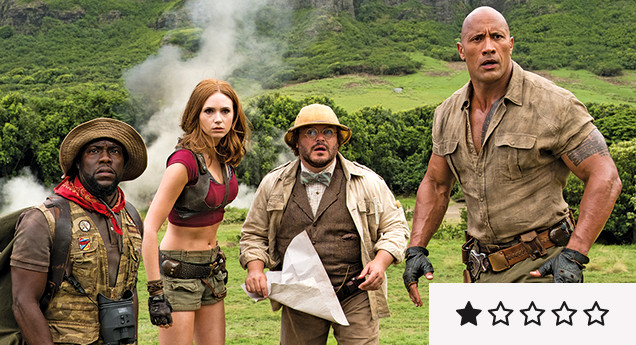Review: ‘Jumanji: Welcome to the Jungle’ is a lazy, lifeless, soul-sucking sequel


The trailer for Jumanji: Welcome to the Jungle generated controversy when it premiered in June. Viewers fumed that the only female character out of four leads was a sexually objectified, Lara Croft-like hottie, in nonsensical jungle attire. The cast, including the actor who plays the skimpily dressed character in question, Karen Gillan, and her co-star Dwayne Johnson, assured fans there was good reason for this.
As it turns out, that reason is because her character, Ruby Roundhouse, is styled in the manner of a 90s video game heroine and therefore knowingly a trope: the sexy, leggy, arse-kicking adventurer. In other words, the filmmakers acknowledge an issue with a certain kind of character presented in a certain kind of way, then set out to perpetuate the problem – capitalising on the objectifying attitudes that allowed the trope to exist in the first place.
The Roundhouse debacle highlights a problem core to Welcome to the Jungle. The director Jake Kasdan wants you to think his movie is modern and forward-thinking, but it is actually lazy, self-defeating and threadbare – with zero insight or satirical perspective, and almost the same entertainment factor.
To make matters worse, Roundhouse is an avatar inhabited and magically activated by Martha (Morgan Turner). She is the awkward, dweeby virgin: another female stereotype as stale and hackneyed as the gorgeous klutz, the spicy Latina or the sexy, leggy, arse-kicking video game adventurer. The film offers not one trope but two, layered like a bargain-counter babushka doll, with barely a pretense of added depth.
The original Jumanji – released in 1995 and directed by Joe Johnston – was partly a coat hanger for special effects, but also highly impressive: a family movie with the unusual distinction of being drenched in dread, with a throat-clutching ambience more comparable to psychological horror than Happy Meals. Kasdan’s sequel turns this fine, carnage-filled film into a laughing stock – delivering a lame-brained and ill-judged comedic sequel, with endless dick jokes and Freaky Friday-esque body swapping gags.
Now a magical gaming console rather than a board game, Jumanji is activated via a Breakfast Club-like setup, when five cutout high school personalities (dork, jock, pretty girl etc) discover it during detention and are transported into its world. They must achieve various challenges in order to be transported back to reality. Selfie-obsessed hot girl Bethany (Madison Iseman) transmogrifies into an avatar played by Jack Black; cue jokes about being disgusted by her new appearance but fascinated by her penis.
The body-morphing concept allows the actors to play against type – i.e. Black as a Ja’mie-esque teenager – and/or send up their distinctive characteristics. Thus Dwayne Johnson as Dr. Smolder Bravestone – formerly the geeky Spencer (Alex Wolff) – who ogles at his own muscles and performs “smouldering” looks. The sloppiness of Kasdan’s designed-by-committee screenplay is most brazenly apparent when the characters discover themselves delivering dialogue forced out of their mouths by the game.
What a dispiriting, defeatist trajectory: four thick-witted stereotypes (the high school kids) are replaced with four other thick-witted stereotypes (the game characters) then replaced with…nothing – just a voice from inside the machine. No surprise, then, that Welcome to the Jungle feels both moronic and lifeless: a faulty cartridge packaged and sold as a shameless, brand-hijacking cash grab.
Find times & tickets for ‘Jumanji: Welcome to the Jungle’
















